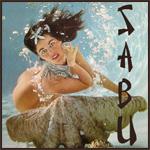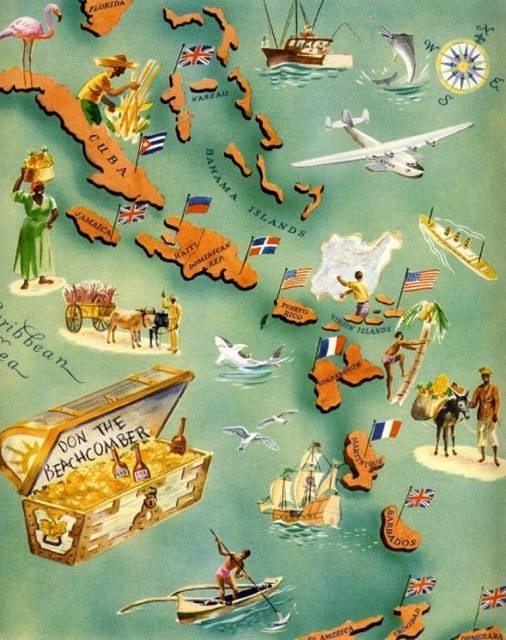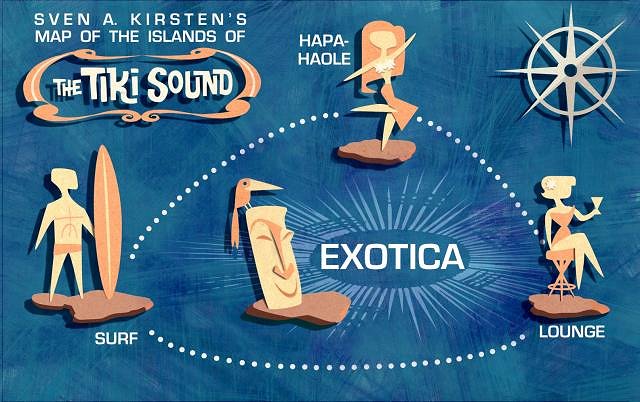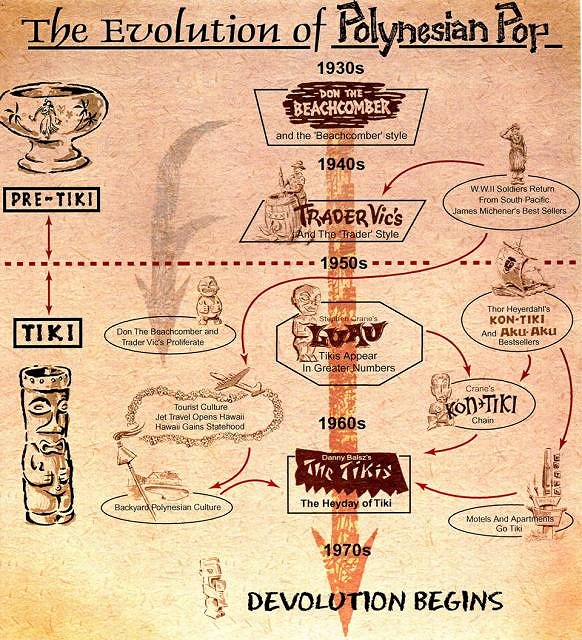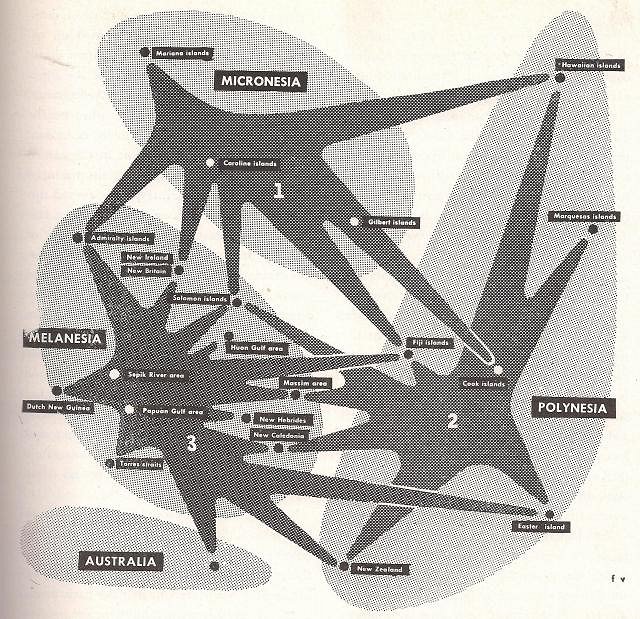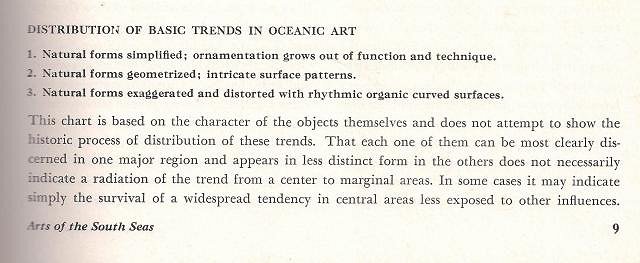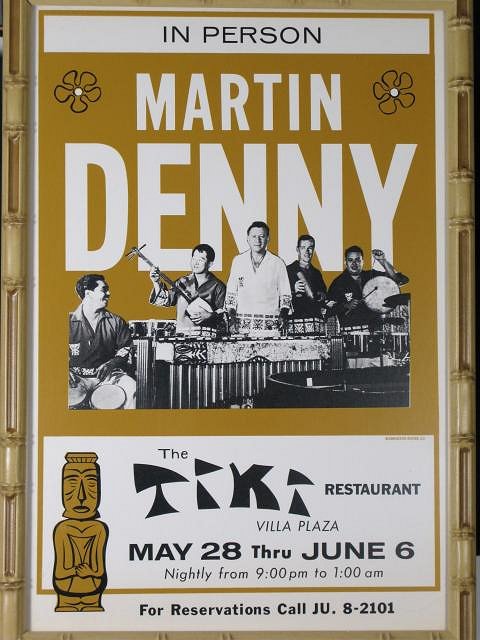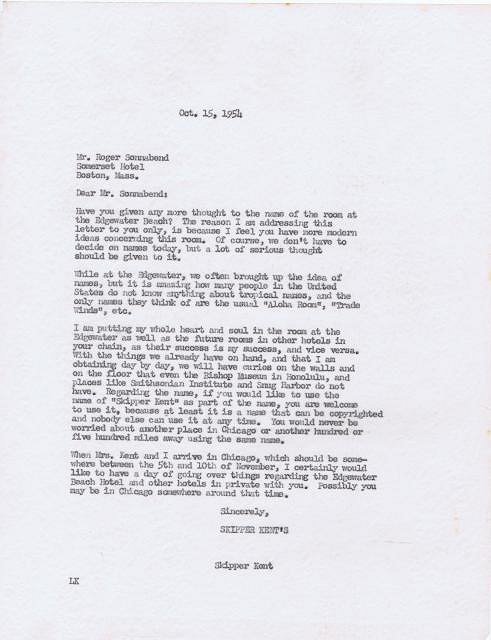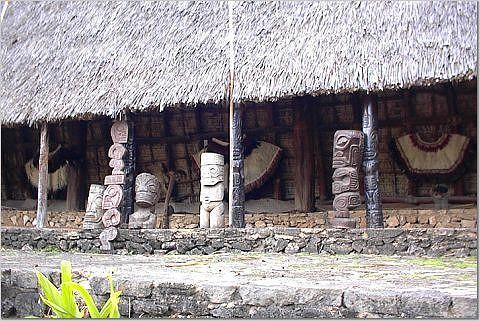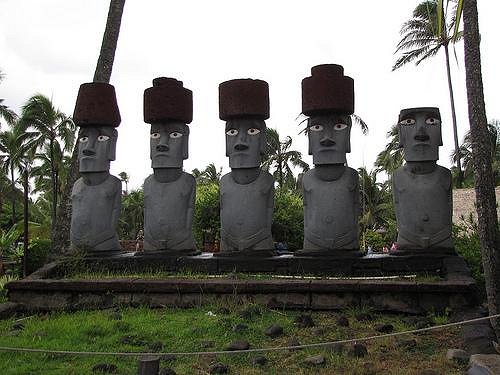Tiki Central / General Tiki
Tiki Culture - Geographical Origins
|
STCB

Sabu The Coconut Boy
Posted
posted
on
Fri, Apr 22, 2011 4:16 PM
Back to the questions of Geographical Origins to the "fake" Tiki Culture in the United States, we also have hints from the early restaurant menus of the movement, each one showing the influences to the manufactured South Seas experience found in each restaurant: :down: Don The Beachcomber:
:down: Trader Vic (Oakland era): :down: Skipper Kent: They represent the tamer, more idyllic areas of the south seas; the same destinations to which you could travel on a Matson cruise in the 1930s or 40s. (The frightening lands of Melanisia and New Guinea are absent). Skipper Kent's is slightly different in that it includes the Caribbean and East Indies as influences.
[ Edited by: Sabu The Coconut Boy 2011-04-22 17:21 ] |
|
D
Dustycajun
Posted
posted
on
Fri, Apr 22, 2011 8:02 PM
Sabu, Great stuff as usual. That time-line is nice, how did you figure all of that out? Don the Beachcomber also had that back menu page that had some Caribbean imagery.
DC |
|
T

tikibars
Posted
posted
on
Fri, Apr 22, 2011 11:51 PM
Hi Shipman Just found this thread... and I will admit to skipping to the end and replying before reading other replies, so as not to be biased by them. So. "We like to think that all of the iconography of Poly Pop comes from a single island, the isle of Tiki. This place of gathering is located south of Hawai'i, north of Aotearoa [New Zealand], east of French Polynesia, and west of Rapa Nui [Easter Island]." ... ...I was of course referring to an imaginary place in Polynesia that is centrally located between all of the mentioned island groups, but which is part of none of them. The point was that Polynesian Pop draws inspiration from many parts of the Polynesian triangle, but is truly not a real part of any one of the many diverse cultures of Polynesia. As I see it, Tiki is the mythology of an imaginary island, positioned exactly where my words have placed it. I like to imagine Tiki as an ersatz island that has been influenced by all of the cultures surrounding it, but which it truly a part of none of them. We all (hopefully) respect the real-life Maori, the Rapa Nui, the Haiwai'ians, etc., and understand that Tiki is not truly a part of any of these cultures, but a fantasy melding of them all that (again) I like to think exists at an imaginary central point, geographically located between them all. But where did "Tiki" as a meme or pop phenomenon truly originate? In spite of all of the so-called pre-tiki or tropical junk that existed, I personally peg the seed of it all it at Don the Beachcomber in Los Angeles, in 1934... and then it spread and grew and changed... But in a lot of ways, Tiki as we know it today is more about the nostalgia for the 1940s to 1960s Tiki, which has been molded in our contemporary perspective by Sven, Otto, Shag, me, and many others who began discovering its joys in the late 1980s-early 1990s. I have yet to meet many people who were actually Tiki bar fanatics - Tiki fanboys so to speak - in 1961 or so, or people who can talk of Tiki from an enthusiastic customer's , opposed to being a bar or restaurant owner or a decor creator. Was anyone in the 1950s or 1960s actually more enthused about Tiki then than the average bored urbanist is about Thai or Indian dining now? Have any of you seen evidence? Maybe there's a thread about this, I've be out of the loop lately... My two cents....! |
|
B
bigbrotiki
Posted
posted
on
Sat, Apr 23, 2011 9:36 AM
I totally dig the concept of Tiki as its own imaginary isle, maybe someone can make a Polynesian triangle map with it in it, something like this:
One thing is for sure: In its own heyday, Tiki style was not named "Tiki", this term for the genre was created in the 90s. In the 50s and 60s, people did not have the "abstand" to the phenomenon. "Abstand" is German for "distance","separation", and "perspective". In the mid-century, Americans were like children in a candy shop, taking advantage of the horn of plenty of the post-war boom, they didn't stop and THINK about what they were enjoying. So, Tiki was not recognized as a style in its own day, and consequently did not have a name. The only terms I have heard uttered by contemporaries of the style to refer to it was "Polynesian" and - in rare instances - KON Tiki style. Your question about people in the day being into "it" like we are now brings to mind what I call the "Polynesiac" of the period, an individual who was a fan of all things Hawaiian/Tahitian/South Seas, beyond the average Tiki bar customer. These people had the most elaborate rumpus rooms and backyard Polynesias, and freely mixed collecting authentic artifacts with tourist art and Polynesian pop items. For some of them, it was the pre-stage to trying their luck at opening their own Tiki restaurant.
Regarding this statement, I respectfully have to point out again that Don did not use Tikis as logos, as decor, as mugs or even the name in his restaurants. Yes, he was the main originator of many of the ACCOUTREMENTS and CONCEPTS of the style - but without the participation of the actual Tiki image. This is what I called Polynesian Pop in the Pre-Tiki stage:
(I have to amend this chart by saying the decades would have been better spaced in mid-decade, i.e. that the main Tiki period happened between 1955 and 1965, with its peak being in the early 60s) All this brings up the question of WHEN the name of the style was coined. The 80s underground artists like Jeffrey Vallance played with the Tiki image, yes, but they did not name it so, their focus was mostly on EXOTICA as a genre. I came up with the title for my first book in 1992, Otto started Tiki News in 1994. I believe that what lead me, and Otto and many of us to choose Tiki as the moniker for our passion was what has inspired many archeologists: A piece of pottery. The finding and subsequent collecting of Tiki mugs, with restaurant names and locations on them, lead me to look for THAT image and name in other forms. |
|
A
arriano
Posted
posted
on
Sat, Apr 23, 2011 10:32 AM
Oxford English Dictionary tiki, n.
1939 X. Herbert Capricornia xxvii. 408 The rest were a fish-spear, a kylie, a yam-stick, a dilly-bag, and a tikki fire-lighting set. 1952 Trader Vic's Kitchen Kibitzer 208 Tiki Punch. 8 ounces Triple Sec 8 ounces gin 3 ounces fresh lime juice 2 fifths chilled champagne, [etc.]. 1963 Times 26 Feb. 8/4 Breech-clouted Hawaiians blow conch shells and light gas-flared tiki torches on hotel payrolls. 1975 Times 17 Mar. 1/6 (advt.) By the flickering light of a Tiki lamp, you'll delight in sampling exotic dishes. 1981 B. Granger Schism (1982) xiii. 116 The tiki bar behind the hotel on the beach side was designed like a grass hut. 1985 Smithsonian Jan. 30/3 Just two hours south of Washington, D.C.,¨Eis a whole different world. Commercial fishermen ply their trade in undershirts. Tiki bars broadcast popular music into the subtropical night. 1990 Seattle Times 4 Mar. (¡®Pacific¡¯ section) 20/3 The Polynesian is thatched roofs, tiki torches and Disney kitsch. ¡ý |
|
TS
Tiki Shaker
Posted
posted
on
Sat, Apr 23, 2011 10:57 AM
First off, I do have to agree that California is the true origin of tiki culture. I also think it has continued to be the the source of the general publics awareness of "tiki". Something I think is sometimes overlooked when we have these discussions about tiki (I don't think it has been brought up yet in this thread), is the importance Disneyland has had, and continues to have on the publics perception of tiki. Tahitian Terrace opened in the early sixties and lasted until the mid nineties I think? The Enchanted Tiki Room opened in the mid sixties and continues to operate in most of its (thankfully) original glory? To think of how many people, from all around the world have visited Disneyland since the mid sixties and got to experience The Enchanted Tiki Room. I can't even fathom what that number would be. People from parts of the US where tiki restaurants didn't/don't exist, visited Disneyland and went to the TIki Room. People from all around the world... the same is true. Think of how many people in the world have experienced either The Enchanted Tiki Room or, back in its day, The Tahitian Terrace. I wonder what percentage of the worlds population has heard the term "tiki". And out of those, how many would associate it with a memory of Disneyland? |
|
B
bigbrotiki
Posted
posted
on
Sat, Apr 23, 2011 3:36 PM
The dictionary seems to be mixing up "tiki" with "Tiki style". The first is a word that DOES very well exist in the languages of the Pacific, and the latter (Tiki STYLE) while not exactly unknown, was simply not AS present in Polynesia as it was on the American mainland. I should be happy about this entry, because it locks "tiki" firmly onto the mainland, but the reality was just not that simple. The rest of the quotes are an incoherent jumble from inconsequential sources that amount to no real information or explanation, instead just further confusion What was the purpose of posting this? |
|
A
arriano
Posted
posted
on
Sun, Apr 24, 2011 9:57 AM
The OED references the earliest found written references (books, newspapers, journals, etc.) of words and terms. Uses of such words and terms may have been earlier (verbally, commercial signs, etc.), but these are the earliest found written references by OED staff. And that's not to say there aren't written references out there that the staff hasn't found. |
|
D
Dustycajun
Posted
posted
on
Sun, Apr 24, 2011 10:12 AM
From a geographical perspective, and as the early guidebook for the American Tiki artisans, the map from Arts of the South Seas book delineating the various Oceanic art styles of the South Pacific.
DC |
|
B
bigbrotiki
Posted
posted
on
Sun, Apr 24, 2011 12:58 PM
I have always loved that map for its modernist "amoeba" graphics. I need to make one for American Tiki culture, with California in the South, Washington (Witco) in the North, and Florida (various artistes) in the West. :) And then marry the two to show the original Pacific style influences on America! :D |
|
J
JOHN-O
Posted
posted
on
Sun, Apr 24, 2011 2:32 PM
Hmmm... The use of "Tiki" as an adjective in the term "Tiki bar" would suggest a style of bar, no? Are we saying that throughout the 1960's, there was no popular use of term "Tiki bar" ?? Arriano's dictionary post would seem to support that. |
|
B
bigbrotiki
Posted
posted
on
Sun, Apr 24, 2011 2:56 PM
I am sorry, but all that dictionary entry supports is confusion. The quotes and sources are so random and inconsequential to what we know as Tiki culture, it is does not say anything. Dictionaries obviously cannot nail every obscure popular culture phenomenon out there, especially something that has not been represented by sufficient literature until recently. A fact which was established by this thread: http://www.tikicentral.com/viewtopic.php?topic=38677&forum=1 Statistics and computers cannot explain everything, it takes people with eyes to see and brains to think. |
|
B
bigbrotiki
Posted
posted
on
Sun, Apr 24, 2011 11:00 PM
Hokeh, time to take a deep breath, bigbro. I have to sincerely apologize to Arriano and John-O for my previous page reactions to their above posts. Me always being the one who begs "we must differentiate, folks!", here I go just BARRELING through with blinders on and belligerently wiping all other arguments off the slate, completely fulfilling the German demagogue cliche that my critics have of me, and betraying my friends who see me as a reasonable, rational human being. Unforgivable and embarrassing! I must admit to having been irritated recently by posts that in my mind smart-assedly bring up exemptions to a rule that just confuse and weaken the issue at hand, thus being de-constructive instead of helpful and enlightening, like John-O's recent Bacardi post for example. Objectively viewed, Arriano's Oxford Dictionary quote was not entirely in that vein, though. It was a fair response to my over-simplified statements with which I SEEMED to be saying that the word "Tiki" DID NOT EXIST as a label in its heyday. I am sorry if it sounded that way, but I did not aim to deny the term's complete existence by saying: I was talking about the use of the word as a label for the WHOLE pop culture GENRE, as a term for the decor, art and architectural STYLE. Please allow me to differentiate, even if too late, in the case of: Trader Vic's "Tiki punch": a single name for a drink, not significant enough to name a style 1963 Times and 1975 Times: "Tiki torch" was a brand name and a popular descriptive. What came first? Dunno. Did it describe a whole style? No. 1981 B. Granger Schism and 1985 Smithsonian: "Tiki Bars" Aaaah! A name for a certain type of bar! I stand corrected - to some degree: In the 80s, writers were already looking in retrospect - and it still does not show the word's use for the whole genre: One thing I know for sure is that there were no "Tiki Restaurants", no "Tiki Motels", no "Tiki Apartment buildings", no "Tiki Bowling Alleys", and certainly no "Tiki Cocktails" in common use in the popular language of the 1960s, 70s and 80s. John-O, do find the use of "Tiki Bar" for me in the 60s, and you can call me a liar. :) And again: Single exceptions do not affect the rule!:
[ Edited by: bigbrotiki 2011-04-24 23:07 ] |
|
STCB

Sabu The Coconut Boy
Posted
posted
on
Mon, Apr 25, 2011 3:25 PM
Hey, DC! Thanks for that image - I had forgotten that Don The Beachcomber used Caribbean imagery on the back of his menus. He and Skipper Kent show more similarities all the time. My timeline was sourced from the online newspaper archives of the Oakland Tribune (they go way back), as well as some previous research here on TC. |
|
B
bigbrotiki
Posted
posted
on
Mon, Apr 25, 2011 11:28 PM
Sabu, I have been wanting to answer to your wonderful post for a while, but all this other "stuff" came up and needed to be clarified... I have been fascinated by the figure of Frank Kent ever since bifcozz came into his amazing inheritance of papers and ephemera. Obviously Kent was much more than just a Trader Vic train jumper with his Zombie Village across the way. His is a mysterious story of synchronicity, and looking at your time line we may never know for certain who influenced whom. One thing seems to be for certain, though: He was a REAL Polynesiac, a lover of the islands, and it seems (all this is hypothetical) that that made him a lesser business man than Victor Bergeron and Steve Crane - another thing he shared with Donn Beach. Ultimately he was less influential to Polynesian pop, and certainly to Tiki style, because at the time it REALLY took of, he had already checked out and gone native - just like Don did. One letter particularly strikes me...here is its context: By the mid-50s, the big American hotel chains began to compete with each other for designers of Polynesian lounges. Trader Vic had opened his first franchise in Seattle in 1949, Don the Beachcomber in Chicago in 1940. The "Hotel Corporation of America" pegged Skipper Kent to be their man from Polynesia:
Here Kent is not telling the Hotel to use his name, he is feebly offering it as a suggestion, while worrying about the lack of the public's understanding of Polynesian names (within a few years, Polynesian names were everywhere). And he speaks of putting his HEART AND SOUL into building the Polynesian Room, which I believe is true. This shows to me that Frank Kent was less of a pragmatic business man who was just playing with the theme, but a ROMANTIC who was really living it, and living for it. Another factor could have been age: With his romanticism, he seems to have belonged to the Don Blanding generation more than the Rat Pack generation, and probably was kinda "old fashioned" in comparison to someone like Steve Crane. In any case, the fact remains that, though he was into the Polynesian theme ahead of the pack, and thus positioned to be successful, his franchises did not really take of. The complexities of opening franchises on the other side of the continent become apparent in his letters, be it training the backstage help, or delegating other responsibilities. Maybe the hotel execs were control freaks and committee decisions were too indifferent, who knows. This brings me to the conclusion that while Skipper Kent may have been influential behind the scenes, his influence on Polynesian pop was not as widespread as Don's, Vic's and Steve's. Which is just an observation, not a judgement, to me he seems much more interesting and sympathetic because of his romantic, unbusiness-like nature. |
|
C
christiki295
Posted
posted
on
Mon, Apr 25, 2011 11:33 PM
True, but let's also add the Polynesian Cultural Center into the mix, for a more authentic Tiki indoctrination: Marquesas:
Easter Island:
[ Edited by: christiki295 2011-04-25 23:36 ] |
|
B
bigbrotiki
Posted
posted
on
Tue, Apr 26, 2011 9:48 AM
I woke up musing some more about Skipper Kent...like: What is in a name? Why were "Don The Beachcomber" and "Trader Vic" more successful in branding themselves as such? Why did the Hotel Corp execs choose the much too generic "Polynesian Village" for their tropical lounges? Was the "Skipper Kent" moniker not evocative enough? Or WOULD the franchise been more successful with that name? Also: Looking at some of the Polynesian Village rooms, as beautiful and exotic as they are, they seem a little flimsy, not as solid as a Trader Vic's. Maybe because the heavy wood Tiki columns that anchored the space are missing? I would really like to sit down with Sabu, bifcozz, DC, and some deep poly pop diggers for a "Skipper Kent Symposium", echanging some of those thoughts and hypotheses... |




